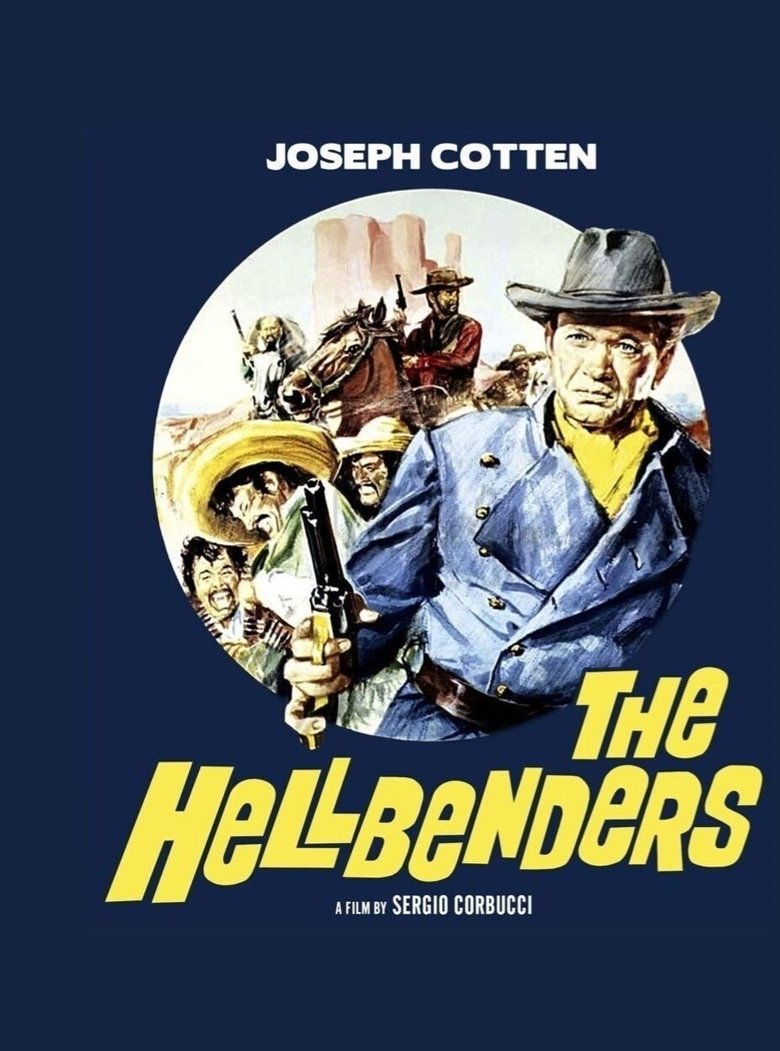
The Hellbenders
A Southern Colonel, his three sons, and a card shark embark on an odyssey through the Southwest carrying a coffin full of stolen money with which the Colonel plans to revive the Confederacy.

A Southern Colonel, his three sons, and a card shark embark on an odyssey through the Southwest carrying a coffin full of stolen money with which the Colonel plans to revive the Confederacy.

The Cruel Ones: The madness of a lost cause
RELEASED IN 1967 and directed by Sergio Corbucci, "Hellbenders" (Italian title: "The Cruel Ones") stars Joseph Cotton as Colonel Jonas, an unrepentant Confederate who led a regiment called The Hellbenders during the Civil War. Lee surrendered and the war's over, but not for Jonas and his three sons. They ruthlessly rob a Union convoy in the Southwest carrying $1 million. The money is placed in a coffin and disguised as the dead husband of Jonas' "daughter" (María Martín), really just a booze-guzzling saloon girl he hired to play a widow in case they're stopped. The group not only has to evade the Union Army, but also a posse, Mexican bandits, vengeful Natives, and even each other if they are to get back East with the money to re-start the Civil War. Julian Mateos plays the Colonel's outcast son, Ben, while Gino Pernice plays the maniacal son, Jeff. Norma Bengell is on hand as Claire, a second female they hire.
The ratings for this film are all over the place. Some viewers say it's trash whereas others grant it a surprisingly high grade; and I can see why on both counts. Let's look at the positives and negatives respectively.
While some complain about Joseph Cotton's supposedly wooden performance, his deadpan expressions superbly capture his character's single-minded vision. Jonas' family is nigh insane because they refuse to admit that the Civil War has been lost. His ultimate harebrained purpose is to finance a renewed Civil War. Everything else is secondary, including life itself. Hauling their loot around in a coffin is a symbol for the hopelessness of their cause. You'll hear Jonas talk about God & Scripture now and then, but it's all outward adornment, even while I'm sure he's sincere. He justifies killing Union soldiers on the grounds that they're still at war while he rationalizes murdering hirelings because their motivation is not the Confederate cause but rather filthy lucre. The man's brutal and despicable, but interesting nevertheless. He’s a “Christian” fake, but just doesn’t know it.
I'm thankful for the characters of Ben and Claire without whom there'd be no one to sympathize with amongst the protagonists. In her prime Norma Bengell was one of the most stunning women to walk the earth and the filmmakers were sure to capture this in a pond-bathing sequence where she strips down to black stockings and modest lingerie.
Another positive is that the movie's filled with action and generally maintains your interest even while glaring flaws regularly surface. For the family's nutty scheme to work they resort to nigh absurd deception; and you know what Shakespeare wrote: "O what a tangled web we weave when first we practice to deceive." Something else I liked that can easily be overlooked takes place when the Indians come seeking justice for the death of the chief's daughter and it provokes brother against brother, the Civil War in microcosm.
Ennio Morricone (as Leo Nichols) composed the score with a decent leitmotif. It's full of guttural sounds with interesting percussion, harmonica, trumpets and guitar. But it’s pedestrian compared to “Death Rides a Horse” (1967) and “The Good, the Bad and the Ugly” (1966).
As far as shortcomings go, someone complained about the movie on the grounds that it comes across as if the producers just enlisted several actors & extras and a couple of babes, then got some horses, a couple of coaches, a coffin, some Mexican clothes and made the whole thing up in the Spanish desert as they meandered along. This is my main objection to the movie, particularly in the second half where the scriptwriters (term used loosely) awkwardly try to fit one episode after another into the story. At one point, for instance, Mexican bandits suddenly appear who had absolutely nothing to do with the plot up to this point. They disappear just as quickly when the Federals swiftly arrive. The worst example of this is the odd beggar who appears out of nowhere in the desert in the last act. This entire sequence is so badly done it horribly mars the movie.
A technical cavil: Jonas and his three sons are the remnant of Confederate Hellbenders regiment and you see them equipped with Winchesters. This can be overlooked on the grounds that there were "Yellow Boy" Winchesters in 1866, but the six guns they carry are Colt 1873 Peacemakers, an anachronism that should have been corrected and is hard to ignore if you are familiar with the weaponry.
The melodramatic climax reveals that good intentions were there, but the filmmakers just didn't have the funds to execute properly. If only they had the money "Hellbenders" would rank with the best Spaghetti Westerns. As it is, it's still worth catching for the highlights noted.
THE FILM RUNS 90 minutes and was shot in Spain and Italy.
GRADE: C+